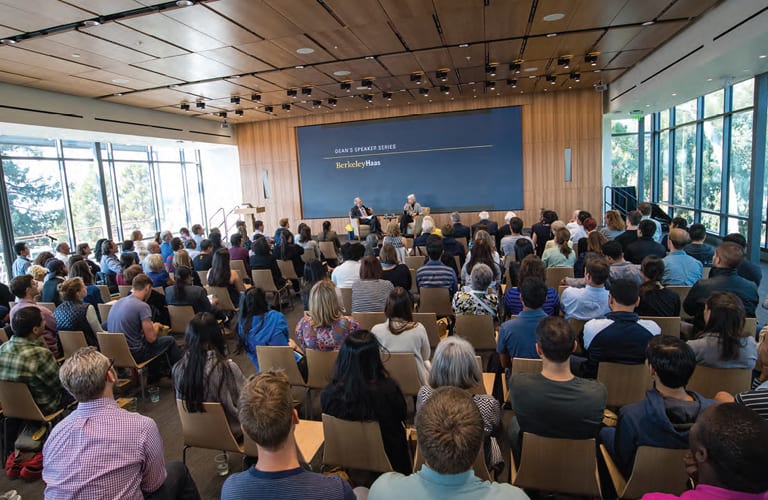
by ClausenCenter | Nov 13, 2023 | Conferences, Events
NOVEMBER 18, 2023
UNIVERSITY OF CALIFORNIA BERKELEY

Program |

Venue |

Photos |

Hotel |

Contact |
UC Berkeley’s Clausen Center for International Business and Policy will hold its 4th biennial Conference on Global Economic Issues: Deglobalization and Fragmentation, on Saturday, November 18, 2023.
The Clausen conference will host prominent economists, policymakers, and industry participants. This year we welcome Pinelopi Goldberg, Elihu Professor of Economics and Professor of Management at Yale University, to give the keynote address.
Thank you for joining us for the 2023 Clausen Center Conference!
We hope you enjoy the conference photos and you can find the participant list here.
We look forward to seeing you again and best wishes for the new year!

PROGRAM
| 8:30-9:00am |
Registration & Breakfast |
| 9:00-9:15am |
Opening Remarks
Benjamin E. Hermalin Executive Vice Chancellor and Provost,
University of California Berkeley |
| 9:15-10:30am |
Session 1 – Energy, Trade and the Environment
Moderator: Pierre-Olivier Gourinchas International Monetary Fund
Panelists:
Cullen S. Hendrix Peterson Institute for International Economics (View Session Slides)
Catherine Wolfram MIT Sloan School of Management
Joseph Shapiro University of California Berkeley (View Session Slides)
|
| 10:30-11:00am |
Break |
| 11:00-12:30pm |
Session 2 – Semiconductors, export restrictions and CHIPs Act
Moderator: Matilde Bombardini University of California Berkeley
Panelists:
Alberto L. Sangiovanni-Vincentelli University of California Berkeley and co-founder of Cadence and Synopsys (View Session Slides)
Chad P. Bown Peterson Institute for International Economics
Matthew S. Borman Deputy Assistant Secretary of Commerce for Export Administration – Bureau of Industry and Security
Ronnie Chatterji Duke University and former White House Coordinator for CHIPS Act Implementation at the National Economic Council (NEC) |
| 12:30-1:45pm |
Lunch |
| 1:45-3:15pm |
Session 3 – Financial issues related to de-dollarization and international capital flows
Moderator: Barry Eichengreen, University of California Berkeley
Panelists:
Patricia C. Mosser Columbia University
Gene Frieda London School of Economics
Matteo Maggiori Stanford Graduate School of Business |
| 3:15-3:45pm |
Break |
| 3:45-4:45pm |
Egon & Joan von Kaschnitz Keynote Lecture
“Globalization in Crisis”
Pinelopi Goldberg Elihu Professor of Economics and Professor of Management, Yale University (View Session Slides) |
| 4:45-5:00pm |
Closing Remarks – Matilde Bombardini and Cecile Gaubert (Clausen Center Co-directors) |
| 5:00-6:00pm |
Reception |

Venue
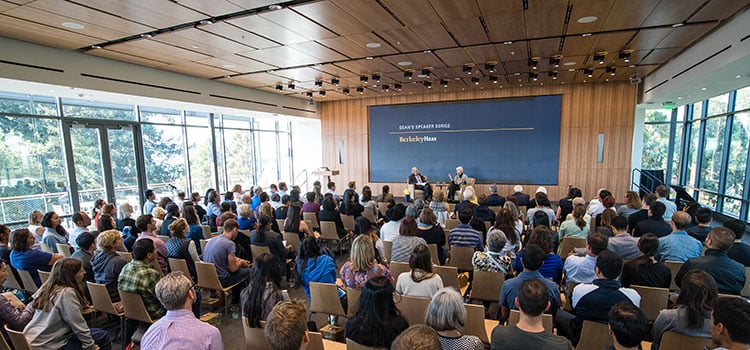 All sessions will be held at:
All sessions will be held at:
Chou Hall
University of California Berkeley
Spieker Forum (6th Floor), Cheit Ln, Berkeley, CA 94720

Parking and Transportation
Parking
Parking Passes for participants can be reserved in advance.
Parking validation is available at Stadium Parking Lot.
Contact econevents@berkeley.edu to request a permit.
Transportation
Shuttle service will be provide to and from the conference venue for all those lodging at Le Meridien San Francisco hotel.
For additional transportation options, please visit Bart.gov or 511.org

Accommodation
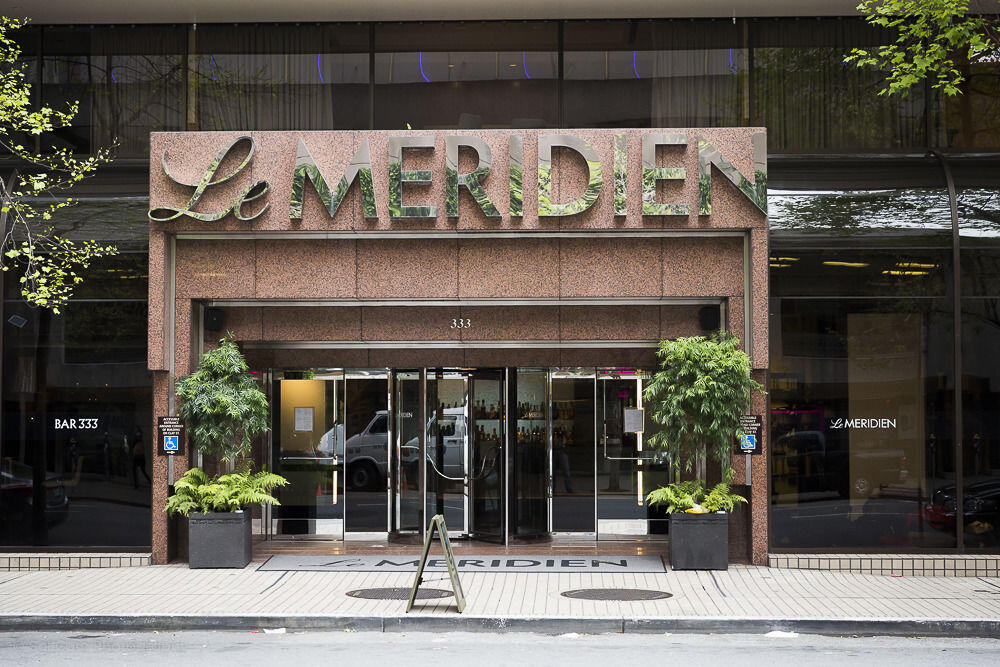 Le Meridien San Francisco, 333 Battery Street, San Francisco
Le Meridien San Francisco, 333 Battery Street, San Francisco
Reservations at Le Meridien are now closed. If you require lodging, we recommend Hotel Shattuck Plaza and Residence Inn.
Conference participants are responsible for any lodging expenses.
Please contact econevents@berkeley.edu for more information about discount rates.

Contact
For questions regarding conference logistics, please contact econevent@berkeley.edu


by ClausenCenter | Jan 5, 2020 | Conferences, Events
FEBRUARY 13-14, 2020
UNIVERSITY OF CALIFORNIA BERKELEY

Program |

Venue |

Transport |

Hotel |

Contact |
UC Berkeley’s Clausen Center for International Business and Policy and the Peterson Institute for International Economics will hold the Conference on Macroeconomic Implications of Trade Policies and Trade Shocks at the University of California, Berkeley, on February 13-14, 2020.
This conference aims to update the analytical framework for analyzing trade policies and trade shocks to encompass modern developments in macro modeling and in trade theory. The goal is to encourage research incorporating the most recent advances in both the trade and macro literatures and allow economists to provide quantitative answers to questions about the short- and long-run impacts of trade policies and shocks on the trade balance, employment, real wages, income distribution, growth, and welfare.
The Peterson Institute for International Economics (PIIE) is an independent nonprofit, nonpartisan research organization dedicated to strengthening prosperity and human welfare in the global economy through expert analysis and practical policy solutions. The Institute is committed to rigorous, intellectually open, and in depth study and discussion. It attempts to anticipate emerging issues and present ideas in useful, accessible formats, to inform and shape public debate. Its audience includes government officials and legislators, business and labor leaders, management and staff at international organizations, university-based scholars and their students, experts at other research institutions and nongovernmental organizations, the media, and the public at large.
Please visit our website for information about our senior fellows, their current research, and our outreach programs.
List of participants can be found here.

PROGRAM
Thursday, February 13
| 8:30am-9:00am |
Registration & Breakfast |
| 9:00am-9:15am |
Welcome Remarks
Ann Harrison, Dean, Haas School of Business
University of California, Berkeley |
| 9:15am-10:15am |
“The Impact of the 2018-19 Trade War on U.S. Prices and Welfare”
Stephen Redding (Princeton University)Click here for Slides |
| 10:15am-10:45am |
Break |
| 10:45am-11:45am |
“Does Trade Policy Uncertainty Affect Global Economic Activity?”
Presenter: Andrea Raffo (Federal Reserve Board)
Click here for Slides
Discussant: Jan Groen (Federal Reserve Bank, New York)
Click here for Slides
Authors: Dario Caldara (Federal Reserve Board), Matteo Iacoviello (Federal Reserve Board), Patrick Molligo (Federal Reserve Board), Andrea Prestipino (Federal Reserve Board), Andrea Raffo (Federal Reserve Board)
|
| 11:45am-12:45pm |
“The Impact of Brexit on UK Firms”
Presenter: Scarlet Chen (Stanford University)
Click here for Slides
Discussant: Thomas Drechsel (University of Maryland)
Click here for SlidesAuthors: Nicholas Bloom (Stanford University), Philip Bunn (Bank of England), Scarlet Chen (Stanford University), Paul Mizen (University of Nottingham), Pawel Smietanka (Bank of England), Gregory Thwaites (London School of Economics) |
| 12:45pm-2:00pm |
Lunch |
| 2:00pm-3:00pm |
“Trade Shocks and Credit Reallocation“
Presenter: Fadi Hassan (Bank of Italy)
Click here for Slides
Discussant: Katheryn Russ (University of California, Davis)
Click here for Slides
Authors: Fadi Hassan (Bank of Italy), Veronica Rappoport (London School of Economics), Stefano Federico (Bank of Italy) |
| 3:00pm-3:30pm |
Break |
| 3:30pm-4:30pm |
“Modeling Trade Tensions: Different Mechanisms in General Equilibrium“
Presenter: Marika Santoro (International Monetary Fund)
Click here for Slides
Discussant: Sherman Robinson (Peterson Institute)
Click here for Slides
Authors: Benjamin Hunt (International Monetary Fund), Rafael Portillo (International Monetary Fund), Susanna Mursula (International Monetary Fund), Marika Santoro (International Monetary Fund) |
| 4:30pm-5:30pm |
Practitioners Panel:
Speakers:
Torsten Slok (Deutsche Bank)
Click here for Slides
Warwick McKibbin (Australian National University)
Robert Koopman (World Trade Organization)
Beth Anne Wilson (Federal Reserve Board) |
| 6:00pm |
Conference Dinner, Great Hall, Bancroft Hotel
2680 Bancroft Way, Berkeley, CA 94704 |
Friday, February 14
| 9:00am-9:30am |
Breakfast |
| 9:30am-10:30am |
“Globalization, Trade Imbalances, and Labor Market Adjustment”
Presenter: Sharon Traiberman (New York University)
Discussant: Oleg Itskhoki (Princeton University)
Authors: Rafael Dix-Carneiro (Duke University), João Paulo Pessoa (Sao Paulo School of Economics), Ricardo Reyes-Heroles (Federal Reserve Bank), Sharon Traiberman (New York University) |
| 10:30am-11:00am |
Break |
| 11:00am-12:00pm |
“A Global View of Creative Destruction”
Presenter: Ishan Nath (University of Chicago)
Discussant: Ariel Burstein (University of California, Los Angeles)
Authors: Chang-Tai Hsieh (University of Chicago), Peter J. Klenow (Stanford University), Ishan Nath (University of Chicago) |
| 12:00pm-1:30pm |
Lunch |
| 1:30pm-2:30pm |
“Tariffs and the Current Account Deficit”
Author: Guido Lorenzoni (Northwestern University)
Discussant: Ina Simonovska (University of California, Davis) |
| 2:30pm-3:30pm |
“Financial Constraints and Propagation of Shocks in Production Networks”
Presenter: Banu Demir (Bilkent University)
Discussant: Federico Huneeus (Yale University)
Authors: Beata Javorcik (University of Oxford), Banu Demir (Bilkent University), Thomasz K. Michalski (HEC Paris), Evren Ors (HEC Paris) |
| 3:30pm-4:00pm |
Break |
| 4:00pm-5:00pm |
Conference Overview Panel:
Speakers:
Olivier Blanchard (Peterson Institute for International Economics)
Marcus Noland (Peterson Institute for International Economics)
Maurice Obstfeld (University of California, Berkeley) |

Venue
 All sessions will be held at:
All sessions will be held at:
Chou Hall
Spieker Forum (6th Floor)
Cheit Ln, Berkeley, CA 94720

Parking and Transportation
Parking
Parking Passes for participants can be reserved in advance. Contact econevents@berkeley.edu to request a permit.
Visitor Parking Map
Transportation
The Hotel Shattuck Plaza is located 1/2 block from the metro BART train (downtown Berkeley station), which is usually the fastest and most convenient transport option from the Oakland and SFO airports.
For additional transportation options, please visit Bart.gov or 511.org

Accommodation
Hotel Shattuck Plaza, Berkeley, CA
 Accommodation will be provided for out-of-town attendees. Please indicate if lodging is desired when completing your registration form and a reservation will be made on your behalf. We strongly recommend that attendees register as soon as possible.
Accommodation will be provided for out-of-town attendees. Please indicate if lodging is desired when completing your registration form and a reservation will be made on your behalf. We strongly recommend that attendees register as soon as possible.
Hotel confirmations will be sent out by January 31, 2020.

Contact
Marcus Noland, mnoland@piie.com
Executive Vice President and Director of Studies, Peterson Institute for International Economics
Maurice Obstfeld, obstfeld@berkeley.edu; mobstfeld@piie.com
Professor of Economics, University of California, Berkeley
Andrés Rodríguez-Clare, arc@berkeley.edu
Professor of Economics, University of California, Berkeley
For questions regarding logistics, please contact econevent@berkeley.edu

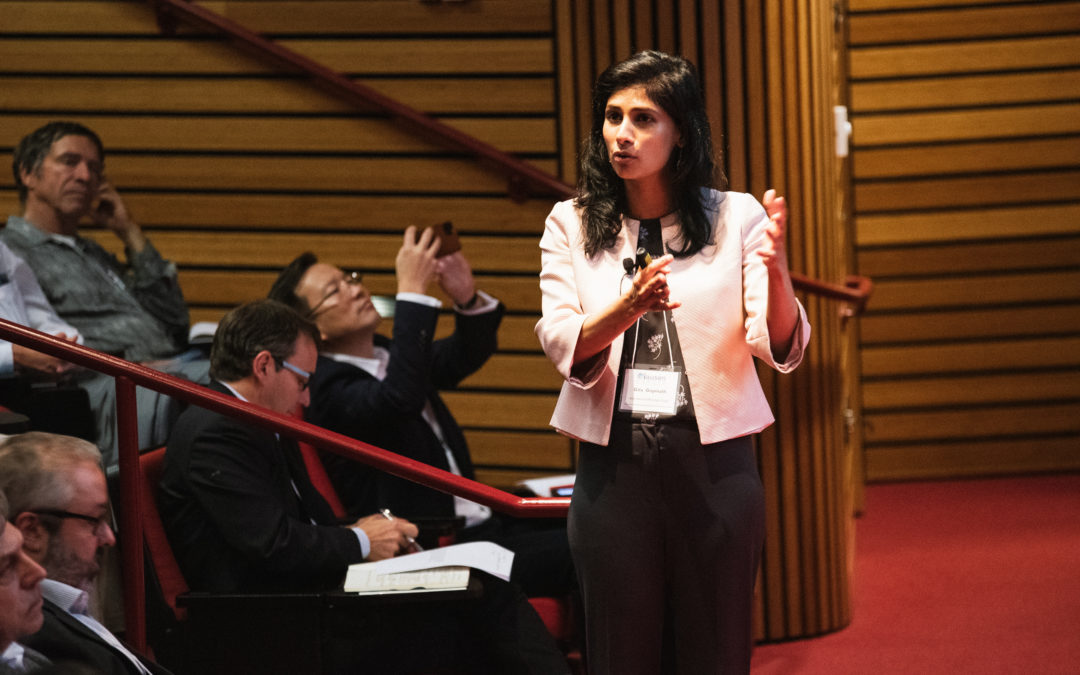
by Katiana Resovich | Dec 23, 2019 | Conferences, Events
Thank you to everyone who attended and participated at the Clausen Center’s 2019 Conference on Global Economic Issues. We are grateful for your support and collaboration.
Opening Remarks
Opening remarks were delivered by Pierre-Olivier Gourinchas (Director, Clausen Center, University of California, Berkeley) and Kim Voss (Acting Dean, Division of Social Sciences, University of California, Berkeley).
Session 1 – Rising Challenges for Emerging Markets
Session 1 was chaired by Carlos Carvalho (Former Deputy Governor, Economic Policy, Central Bank of Brazil) and featured the following panelists:
- Alan Taylor, Professor, University of California, Davis
- Veronica Rappoport, Vice President, Central Bank of Argentina
- Calvin Ho, Senior Vice President and Director of Research, Templeton Global Macro
Click here for Session 1 Slides.
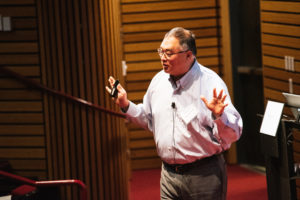
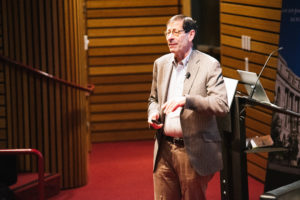
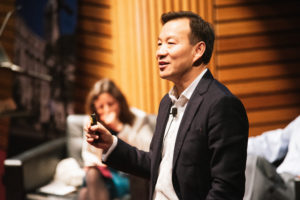
Session 2 – China
Session 2 was chaired by Galina Hale (Research Advisor, Federal Reserve Bank of San Francisco) and featured the following panelists:
Click here for Session 2 Slides
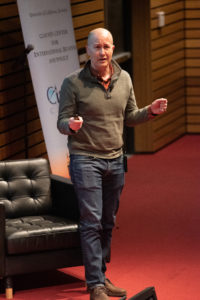
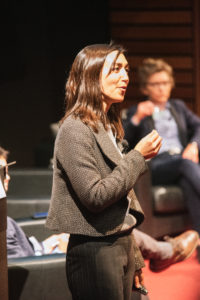
Session 3 – Macro Implications of Structural Change in the Labor Market
Session 3 was chaired by Andres Rodriguez-Clare (University of California, Berkeley) and featured the following panelists:
- Emi Nakamura, Professor, University of California, Berkeley
- Mary Daly, President, Federal Reserve Bank, San Francisco
- Jed Kolko, Chief Economist, Indeed
Click here for Session 3 Slides
For more details about Mary Daly’s presentation and remarks, see the recent Reuters article here.
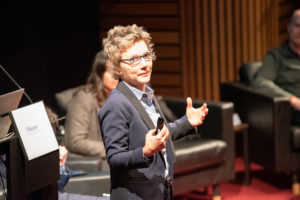
Egon & Joan von Kaschnitz Lecture
Gita Gopinath delivering the Keynote Lecture. Photo Credit: Matt Wong.
The Keynote lecture, titled “A Case for an Intergrated Policy Framework,” was delivered by Gita Gopinath (Economic Counsellor and Director of Research, International Monetary Fund).
Click here for slides of the Keynote Lecture.
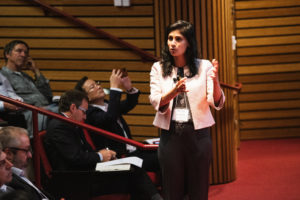
Photo Credit: Matthew L. Wong
Reception
After the Sessions and Keynote Lecture, participants enjoyed food and drinks over conversation during the Conference reception.
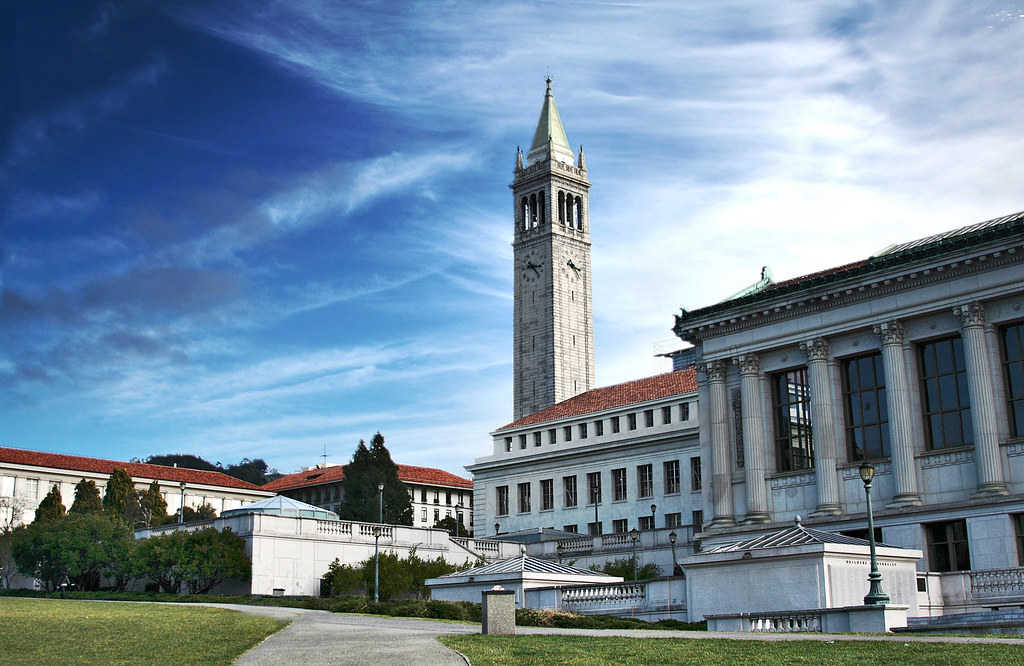
by ClausenCenter | Oct 31, 2019 | Conferences, Events

Program |

Venue |

Transport |

Hotel |

Contact |
UC Berkeley’s Clausen Center for International Business and Policy will hold its 3rd biennial Conference on Global Economic Issues on Saturday, November 16, 2019.
As in previous years, this invitation-only event will host prominent economists, policymakers, and industry participants. Some of our confirmed participants include Mary Daly, President, SF Federal Reserve; Calvin Ho, Senior Vice President and Director of Research for Templeton Global Macro; Jed Kolko, Chief Economist at Indeed; and Emi Nakamura, Andres Rodriguez-Clare, and Maurice Obstfeld all from University of California, Berkeley.
This year we welcome Dr. Gita Gopinath, IMF Economic Counsellor and Director of Research to give the keynote address.
We hope you can join us for what promises to be a lively and stimulating event.
>> Click here to view Clausen Conference 2019 Participant List
Program
| 9:00am-9:30am |
Registration & Breakfast |
| 9:30am-9:45am |
Opening Remarks
Pierre-Olivier Gourinchas, Director, Clausen Center, University of California, Berkeley
Kim Voss, Acting Dean, Division of Social Sciences, University of California, Berkeley |
| 9:45am-11:00am |
Session 1 – Rising Challenges for Emerging Markets
Chair: Carlos Carvalho, Former Deputy Governor, Economic Policy, Central Bank of Brazil
Panelists:
Alan Taylor, Professor, University of California, Davis
Veronica Rappoport, Vice President, Central Bank of Argentina
Calvin Ho, Senior Vice President and Director of Research, Templeton Global Macro
>> Click here for Session 1 Slides |
| 11:00am-11:15am |
Break |
| 11:15am-12:30pm |
Session 2 – China
Chair: Galina Hale, Research Advisor, Federal Reserve Bank of San Francisco
Panelists:
Chang-Tai Hsieh, Professor, University of Chicago
Maurice Obstfeld, Professor, University of California, Berkeley
Jeff Shen, Managing Director, BlackRock
>> Click here for Session 2 Slides |
| 12:30pm-2:00pm |
Lunch |
| 2:00pm-3:15pm |
Session 3 – Macro Implications of Structural Change in the Labor Market
Chair: Andres Rodriguez-Clare, University of California, Berkeley
Panelists:
Emi Nakamura, Professor, University of California, Berkeley
Mary Daly, President, Federal Reserve Bank, San Francisco
Jed Kolko, Chief Economist, Indeed
>> Click here for Session 3 Slides |
| 3:15pm-3:45pm |
Break |
| 3:45pm-4:45pm |
Egon & Joan von Kaschnitz Lecture
Keynote: Gita Gopinath, Economic Counsellor and Director of Research, International Monetary Fund
“A Case for an Intergrated Policy Framework“ |
| 4:45pm-5:00pm |
Closing remarks |
| 5:00pm-6:00pm |
Reception |

Venue
 All sessions and conference reception will be held at:
All sessions and conference reception will be held at:
David Brower Center
2150 Allston Way, Berkeley, CA 94704

Parking and Transportation
Parking
Parking Passes for participants can be reserved in advance. Contact econevents@berkeley.edu to request a permit.
Visitor Parking Map
Transportation
For additional transportation options, please visit Bart.gov or 511.org

Accommodation
Hyatt Regency, 5 Embarcadero Center, San Francisco
 Accommodation will be provided for out-of-town attendees. Please indicate if lodging is desired when completing your registration form and a reservation will be made on your behalf. We strongly recommend that attendees register by October 16, 2019.
Accommodation will be provided for out-of-town attendees. Please indicate if lodging is desired when completing your registration form and a reservation will be made on your behalf. We strongly recommend that attendees register by October 16, 2019.
Hotel confirmations will be sent out by November 1, 2019.
For guests staying at the SF Hyatt, transportation to and from conference venue will be provided.
NOTE: Berkeley lodging also available upon request.

Contact
For questions or comments please contact:
Clausen Event Staff, econevent@berkeley.edu
Event Planner
Pierre-Olivier Gourinchas, pog@berkeley.edu
Director, Clausen Center for International Business and Policy


by ClausenCenter | Aug 12, 2019 | Conferences, Events, International Trade & Development
Sponsored by the Clausen Center for International Business and Policy at Berkeley and the Peterson Institute for International Economics University of California, Berkeley, February 13-14, 2020
Call for Papers
The last two decades of rapidly shifting comparative advantage have been associated with economic and social dislocations and trade policy tensions. Those factors played a central role in the election of Donald Trump to the U.S. presidency, who followed through on threats of aggressive trade actions against America’s trade partners. Because both major U.S. political parties now embrace trade skepticism, more belligerent international trade policies and the accompanying trade disputes are likely to remain a feature of the global scene even under future presidents.
Much of the trade-skeptic agenda comes from a desire to shift macroeconomic outcomes – whether labor-market outcomes, trade deficits, or overall economic growth. It is therefore critical for policymakers to have a firm grasp on the macro implications of trade policies. The academic literature on that subject has lagged behind modern modeling advances in other areas of economics, perhaps because those advances occurred in a period when a rules-based international trading system largely kept trade hostilities in check. Policymakers intervening to offset supposed effects of trade would also benefit from a better understanding of how the forces of globalization (as opposed to other economic trends) have shaped economic outcomes.
This conference aims to update the analytical framework for analyzing trade policies and trade shocks to encompass modern developments in macro modeling and in trade theory. The goal is to encourage people to write papers that are compatible with the basic requirements in both the trade and macro literatures and allow economists to provide quantitative answers to questions about the short- and long-run impacts of trade policies and shocks on the trade balance, employment, real wages, income distribution, growth, and welfare.
To that end, we welcome submissions across a range of topics that include but are not restricted to theoretical and empirical studies on:
- The effects of trade shocks on
- labor-market dynamics
- income distribution
- external imbalances and growth
- exchange rates
- direct investment flows and production location
- The rising importance and implications of global value chains.
- The appropriate macro policies to deal with trade shocks.
- The links between trade deficits and labor market outcomes.
- The role of bilateral imbalances and the economic costs of trade diversion in response to tariffs.
- The dynamics of trade warfare.
- The possible emergence of regional trading blocs.
- Macro impacts of quotas and other quantitative trade restrictions.
- Impact and longer-run effects of Brexit.
- Trade and investment effects of potential tax reforms.
- The linkages between global trade volume and global growth.
- The effects of trade policy uncertainty
Papers that integrate some aspect of trade in a macro framework will have priority. Proposals should be no more than 300 words in length and should give a clear account of the question(s) to be addressed and the analytical and/or empirical methodology, although they may be accompanied by draft papers.
Please send all proposals to:
The deadline for receipt of proposals is September 12, 2019.
Download a PDF of this call for papers.

by ClausenCenter | Apr 17, 2019 | Conferences, Events

UC Berkeley’s Haas School of Business holds its annual Future of Social Ventures Conference, bringing together members of the social impact community to advance practice, learning, and acceleration for social ventures. This year’s conference celebrates the 20th Anniversary of the Global Social Venture Competition and the theme of Technology for Good.

 All sessions will be held at:
All sessions will be held at: Le Meridien San Francisco, 333 Battery Street, San Francisco
Le Meridien San Francisco, 333 Battery Street, San Francisco

 Accommodation will be provided for out-of-town attendees. Please indicate if lodging is desired when completing your registration form and a reservation will be made on your behalf. We strongly recommend that attendees register as soon as possible.
Accommodation will be provided for out-of-town attendees. Please indicate if lodging is desired when completing your registration form and a reservation will be made on your behalf. We strongly recommend that attendees register as soon as possible.








 All sessions and conference reception will be held at:
All sessions and conference reception will be held at: Accommodation will be provided for out-of-town attendees. Please indicate if lodging is desired when completing your registration form and a reservation will be made on your behalf. We strongly recommend that attendees register by October 16, 2019.
Accommodation will be provided for out-of-town attendees. Please indicate if lodging is desired when completing your registration form and a reservation will be made on your behalf. We strongly recommend that attendees register by October 16, 2019.

